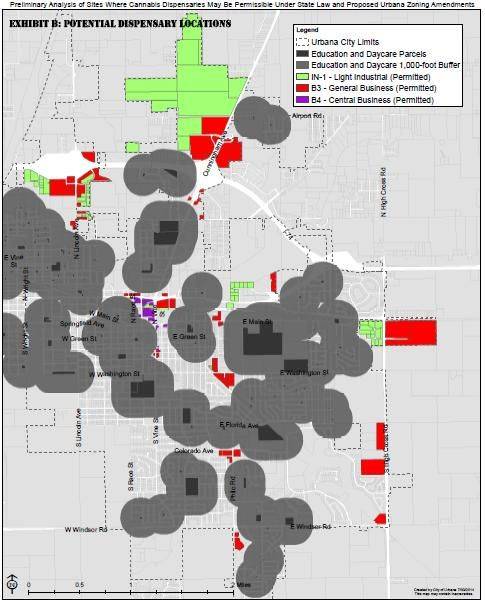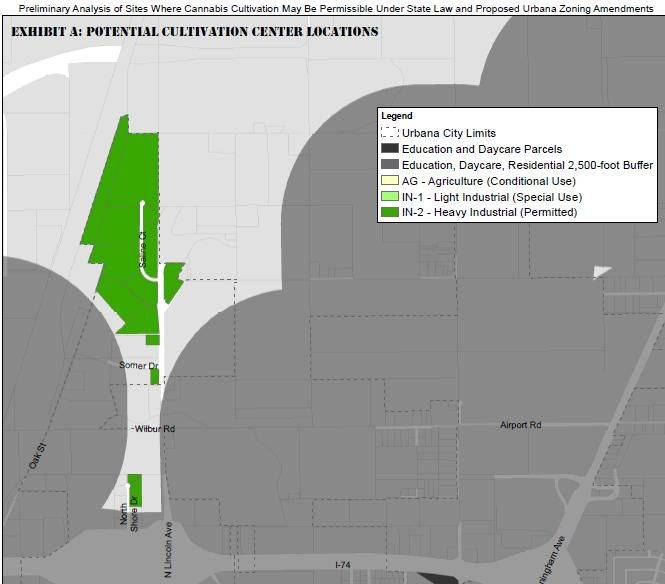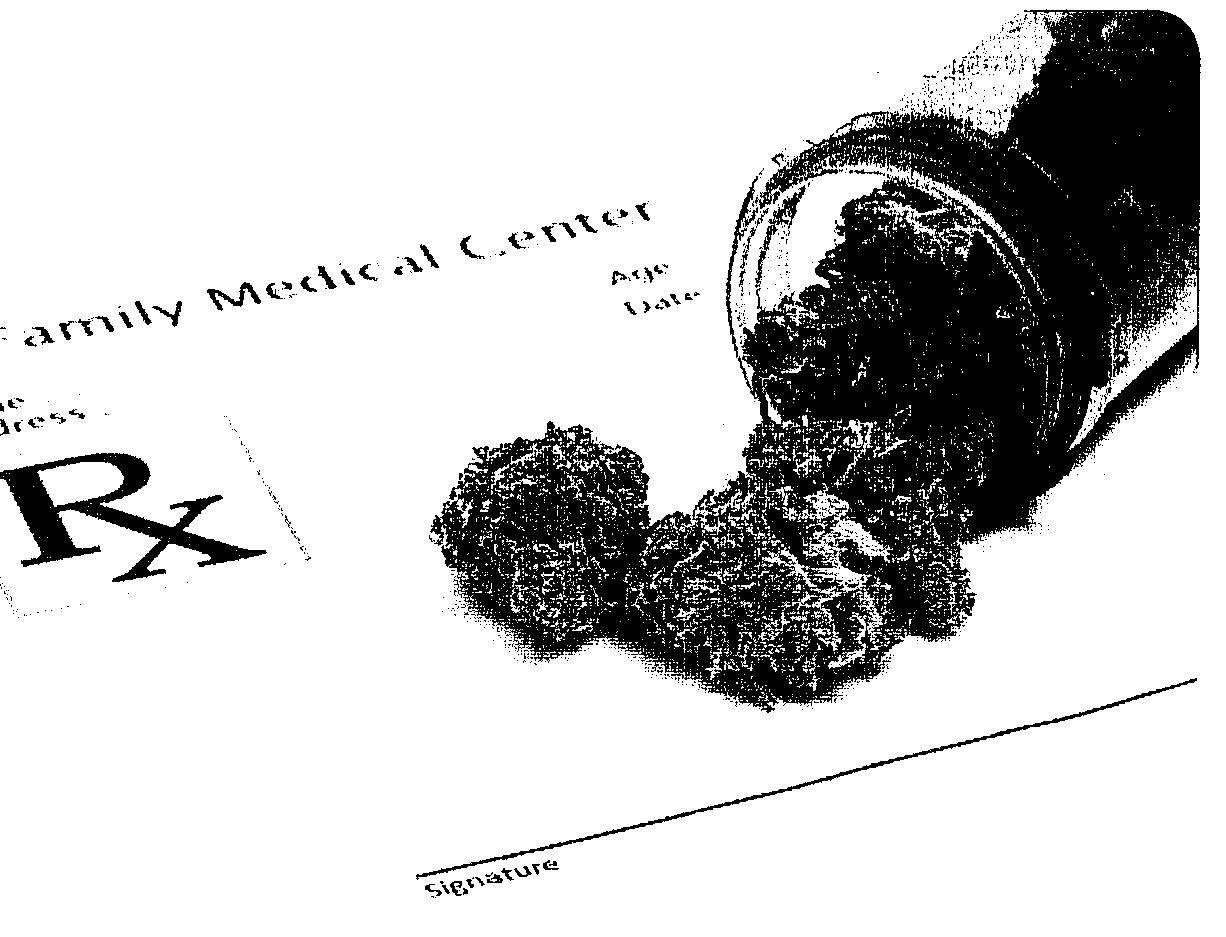It started with the passing of the Compassionate Use of Medical Cannabis Pilot Program Act by the State of Illinois in 2013. The Act set the stage for the use of medical cannabis in Illinois for “serious diseases causing chronic pain and debilitating conditions,” diseases such as cancer, glaucoma, and Multiple Sclerosis, among others.
The rules were simple. Cultivation centers, which grow and process medical marijuana, needed to be 2,500 feet from schools, daycares, and residential areas. Dispensaries, which are like marijuana drugstores, needed to be 1,000 feet from schools and daycares and couldn’t be located in areas zoned for residential use.
Urbana, due to its central location in Illinois, quickly became a target for companies looking to start a cultivation center or dispensary. According to Kevin Garcia, city planner for the City of Urbana and someone heavily involved in the later process of changing city regulations to permit such facilities, companies began contacting the city “several months ago expressing interest in Urbana as a potential place for medical cannabis facilities.”

“Urbana’s political leadership and City staff were receptive to the idea of changing our regulations to permit such facilities, so we got to work,” Garcia wrote in an email to Smile Politely.
The main issue was tailoring the city regulations to allow for a cultivation center and dispensary while adhering to the rules set forth in the Compassionate Use of Medical Cannabis Pilot Program Act.
“Basically, we looked at our existing zoning districts and figured out where medical cannabis facilities logically fit, and then added the siting requirements given by State law to determine where they would be permitted,” Garcia said.
For the staff of the Community Development Services Department and Kevin Garcia, the task was not too difficult.
“The State provided the siting restrictions for cultivation centers and dispensaries, and we wrote our zoning regulations using those restrictions as a guide,” Garcia said. “Our final rules are a little bit more restrictive than the State, but for the most part match what the State laid.
“The most difficult part was deciding which zones were appropriate for medical cannabis uses, but even that was fairly straightforward. We looked at the most similar uses already in our Zoning Ordinance and used those as guidelines for medical cannabis facilities.”
So, why the difference in rules and regulations for cultivation centers and dispensaries?
“There is a difference between the two because they are very different uses, and because the State law places different siting requirements on each,” Garcia said. “Cultivation centers grow and process medical cannabis, which is similar to industrial uses like pharmaceutical manufacturing. Dispensaries are more like drugstores – very specific drugstores – and are treated more like that use. The siting requirements come straight from the State Act; our rules concur with the Act.”
The zoning regulations were finished during the summer and presented to the City Council of Urbana. The vote took place on the night of August 4, under the Ordinance Amending The Zoning Ordinance (Revising Article II and V for Medical Cannabis Dispensaries and Cultivation Facilities). The vote was unanimous.
Medical marijuana is coming to Urbana.
The State law was designed so that each dispensary would serve a regional population, rather than a local population. According to Garcia, the target number of people each dispensary in Illinois would serve is roughly 500,000.
“It’s a new business, and new business is almost always good for the City,” Garcia said. “It will generate some additional tax revenue, which could help to lessen the tax burden on citizens, though the one percent tax rate on medical cannabis (which is the same as other pharmaceuticals) certainly won’t alleviate all of our tax problems.

“In addition, each of the parties interested in opening medical cannabis facilities in Urbana has discussed some form of charitable or other donations for social services (such as mental health, drug abuse treatment, etc.), which could help residents of Urbana and help lessen some of the current financial burdens the City has to provide these services.”
According to Garcia, there are three specific companies interested in building a cultivation center and dispensaries in Urbana. Because the process has yet to be played out and applications are due in two months, the companies declined comment, but Garcia said the application process “will be very interesting” because only one cultivation center and just two dispensaries will be allowed.
“The interesting thing to follow will be the State’s process of judging the applications for medical cannabis facilities,” Garcia told Smile Politely. “As I said, in our nine-county State Police District, only one cultivation center and two dispensaries will be allowed, so expect a healthy competition for the right to build and operate facilities in our region. Last I checked, applications are due by early September, but the final judging criteria have yet to be released… it should be interesting to see how the process plays out.”
The American Medical Association has not publicly endorsed the use of medical marijuana for treatment of “serious diseases causing chronic pain and debilitating conditions,” and Carle Foundation Hospital and Christie Clinic have yet to comment publicly on the news, but according to Garcia “the medical industry and the medical cannabis industry will be separate from one another,” with patients wanting medical marijuana needing to apply to the State to gain access to a dispensary.
But the companies interested in starting medical marijuana facilities in Urbana have already take the initiative to help fund social services, such as “mental health” and “drug abuse treatment.” This could lessen some of the current financial burdens the City of Urbana has to provide for these services.
Most of all, these facilities would provide treatment in the form of medical marijuana to those in Central Illinois who need it, placing Champaign-Urbana as the center for healthcare in central Illinois.
“…a stated objective in the City’s Comprehensive Plan is to strengthen the City’s role as a regional center for healthcare,” Garcia said. “Having a medical cannabis facility to serve the region would help to achieve that objective.”








